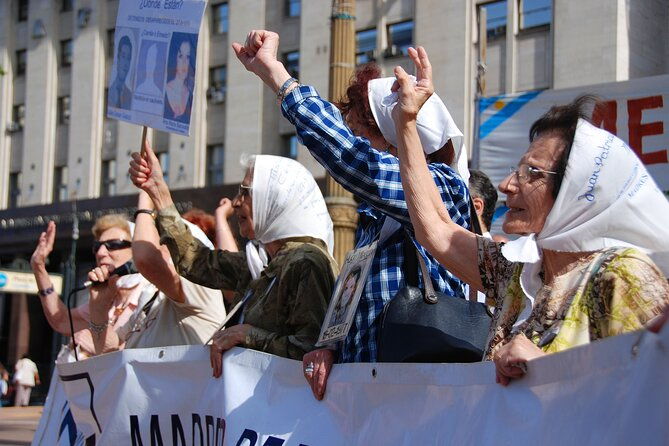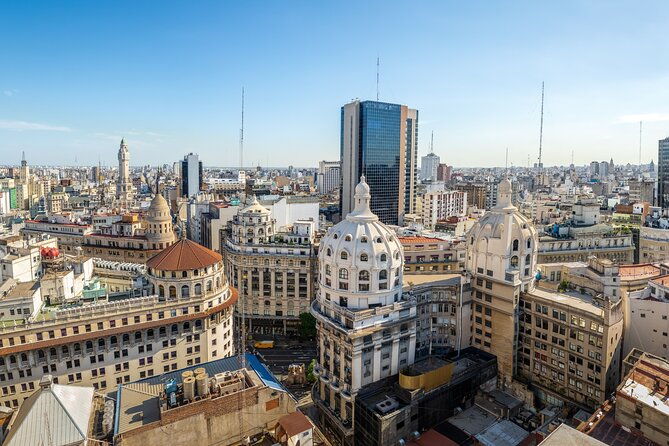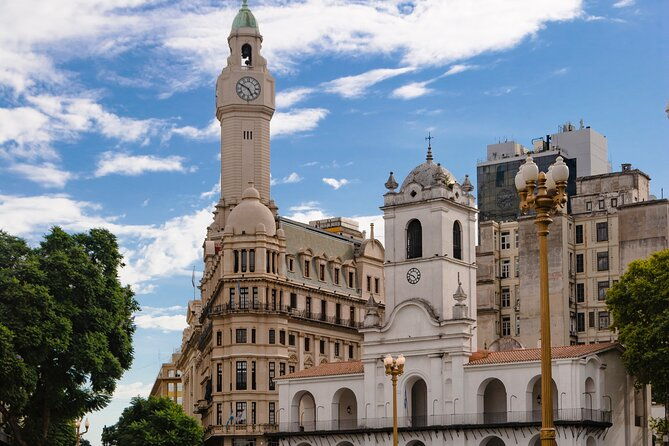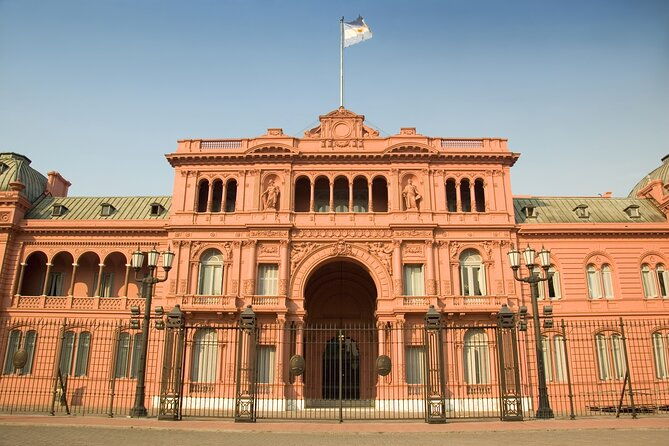Argentina’s tumultuous history has shaped its present-day struggle for democracy and human rights. The Dirty War, a dark chapter marked by state terror and disappearances, has left deep scars on the nation. Yet, the Argentine people have responded with unwavering resilience, confronting their past and memorializing the victims through grassroots movements and civic activism. Their journey towards a society dedicated to justice and freedom offers valuable insights into the power of collective memory and the enduring fight for human rights.
- About Your Stay
- Argentina’s Tumultuous History
- The Dirty War: A Dark Chapter
- Visible Remnants of Conflict
- Confronting the Past, Shaping the Future
- Emotional Journeys Through Buenos Aires
- Uncovering the Significance of the Uprising
- Navigating the Path to Democracy
- Honoring the Struggle for Human Rights
- Questions About Your Stay
- Can I Visit the Sites on My Own Instead of a Tour?
- Is the Tour Suitable for Children and Families?
- Are There Any Physical Requirements for the Walking Tour?
- Can the Tour Be Customized to My Interests?
- What Is the Best Time of Year to Take This Tour?
- Final Verdict On This Stay
- More Tour Reviews in Buenos Aires
- Still browsing? Here are more Buenos Aires experiences we've covered recently
About Your Stay

- The Dirty War under military dictatorship resulted in the forced disappearance and murder of over 30,000 people, leaving a legacy of trauma and the fight for justice.
- Grassroots movements and civic activism played a crucial role in Argentina’s transition from military rule to democracy, overcoming authoritarian resistance.
- Memorials and monuments in Buenos Aires serve as visible reminders of the country’s turbulent past and the resilience of the Argentine people.
- Confronting the historical legacy of human rights abuses has been essential for Argentina in shaping its modern democratic identity and institutions.
- The path to democracy was arduous, requiring political will, free elections, and the prosecution of those responsible for the atrocities of the Dirty War.
Argentina’s Tumultuous History

Although Argentina has long been celebrated for its vibrant culture and stunning natural landscapes, the country’s history has been marked by periods of political turmoil and human rights abuses.
During the 1970s and 80s, the country experienced the Dirty War, a brutal crackdown on dissent by the military junta that resulted in the disappearance of thousands of citizens.
The legacy of this dark chapter continues to shape Argentina’s path towards democracy and justice.
The legacy of Argentina’s Dirty War persists, shaping its ongoing struggle for democracy and justice.
Today, the fight for human rights remains a critical part of the nation’s ongoing struggle to heal from its tumultuous past and build a more just society.
Looking for more options in Buenos Aires? We've reviewed plenty of other experiences.
The Dirty War: A Dark Chapter

The military junta that seized power in Argentina in 1976 quickly embarked on a brutal crackdown known as the Dirty War, which targeted leftist activists, students, intellectuals, and anyone suspected of opposing the regime.
Over 30,000 people were forcibly disappeared, tortured, and killed by the state security forces. The Dirty War left a legacy of trauma, loss, and a determined fight for justice and human rights.
The tour explores:
-
The grim realities of state-sponsored terror and the lasting impact on Argentine society.
-
Efforts by human rights organizations to uncover the truth and hold perpetrators accountable.
-
The ongoing struggle to forge a more democratic and just future for Argentina.
Visible Remnants of Conflict

As visitors explore the streets of Buenos Aires, they can’t help but notice the visible remnants of Argentina’s tumultuous past.
From the memorials and monuments that dot the cityscape to the architectural scars left by violent clashes, the physical evidence of the country’s Dirty War era is omnipresent.
These reminders serve as powerful testaments to the resilience and determination of the Argentine people, who’ve worked tirelessly to uncover the truth, honor the victims, and ensure such atrocities never happen again.
The tour guides on this journey provide invaluable insights into these historical markers, fostering a deeper understanding of Argentina’s complex and inspiring fight for human rights.
Confronting the Past, Shaping the Future

-
Grappling with the Dirty War**: The tour examines the lasting impacts of Argentina’s dark past, shedding light on the atrocities committed during the military dictatorship** and the grassroots movements that fought for justice.
-
Preserving Memory: Exploring the visible remnants of past conflicts, the tour underscores the importance of collective memory, empowering visitors to reflect on the lessons of history and their enduring significance.
-
Building a Brighter Future: Ultimately, the tour illuminates how Argentina’s fight for human rights has shaped its democratic institutions, inspiring hope and a commitment to safeguarding the freedoms won through profound sacrifice.
Emotional Journeys Through Buenos Aires
Stepping into the streets of Buenos Aires, visitors embark on an emotional journey through the city’s storied past. The Forging Democracy tour guides travelers through the visible remnants of Argentina’s Dirty War, uncovering a poignant narrative of resilience and the fight for human rights.
| Highlights | Insights |
| — | — |
| Witness the Plaza de Mayo, where mothers marched for their disappeared children | Hear personal accounts from a guide who experienced the era firsthand |
| Stand before the Ministerio de Defensa, a symbol of the military junta’s power | Understand the lasting impact of this dark chapter on Argentina’s democratic evolution |
| Explore hidden memorials that honor the victims of state-sanctioned violence | Feel the weight of history as you walk the same streets that witnessed the struggle |
Uncovering the Significance of the Uprising

The Argentine fight for human rights was rooted in a pivotal uprising that shook the nation’s foundations. This momentous event, known as the Dirty War, uncovered the depths of the government’s crackdown on dissent and civil liberties.
The tour delves into the significance of this struggle, shedding light on:
-
The systematic disappearance and torture of activists, intellectuals, and civilians who dared to challenge the authoritarian regime.
-
The role of the military junta in perpetuating a culture of fear and repression, and the lasting scars it left on the country.
-
The resilience and courage of the Mothers of the Plaza de Mayo, who fought tirelessly to uncover the truth and demand accountability.
Navigating the Path to Democracy
Following the harrowing revelations of the Dirty War, Argentina embarked on a complex and challenging journey to restore democracy. Dismantling the military dictatorship and transitioning to a stable, representative government required immense political will and public mobilization. Key milestones included the return of free elections, the prosecution of human rights abusers, and the hotel of democratic institutions.
| Milestone | Significance | Obstacles |
| — | — | — |
| Free Elections | Restored popular sovereignty | Resurgent authoritarianism |
| Prosecutions | Accountability for atrocities | Armed forces resistance |
| Institutions | Checks on state power | Entrenched patronage |
| Civic Activism | Grassroots pressure for change | Ongoing political tensions |
| International Support | Diplomatic and financial aid | Geopolitical constraints |
This arduous process shaped Argentina’s modern democratic identity, forged through the struggle for human rights and the rule of law.
Honoring the Struggle for Human Rights
As Argentina grappled with the aftermath of the Dirty War, a resolute movement emerged to honor the victims and enshrine human rights protections.
This grassroots effort sought to:
-
Establish memorials and museums to commemorate the disappeared and educate future generations.
-
Advocate for legal reforms that would prevent the recurrence of state-sanctioned violence and disappearances.
-
Amplify the voices of survivors and families, ensuring their stories were heard and their pursuit of justice was supported.
Through these actions, Argentinians reclaimed their democratic future, forging a national identity rooted in the fundamental rights and freedoms they’d fought so hard to secure.
Questions About Your Stay
Can I Visit the Sites on My Own Instead of a Tour?
You can visit the sites on your own, but a guided tour provides valuable historical context and insights from a specialized expert. The tour also ensures you don’t miss key landmarks and have a seamless experience.
Is the Tour Suitable for Children and Families?
The tour may not be suitable for young children due to the sensitive historical content. However, it could be appropriate for older children and families interested in learning about Argentina’s Dirty War and human rights struggles in an impactful way.
Are There Any Physical Requirements for the Walking Tour?
The tour is not wheelchair accessible, but service animals are allowed. There are no other physical requirements mentioned. Most travelers can participate, ensuring inclusivity for a diverse audience.
Can the Tour Be Customized to My Interests?
Yes, the tour can be customized to your interests. The private nature of the tour allows for flexibility, and the guide is happy to tailor the experience to your specific areas of interest related to Argentina’s Dirty War and human rights history.
What Is the Best Time of Year to Take This Tour?
The best time to take this tour is year-round, as Buenos Aires has a mild climate. However, the shoulder seasons of spring (September-November) and fall (March-May) may offer fewer crowds and more comfortable weather for exploring the city.
Final Verdict On This Stay
The Argentine people’s unwavering fight for justice and human rights serves as a powerful testament to the resilience of democracy. By confronting their nation’s dark past and memorializing the victims of state terror, they’ve paved the way for a future grounded in accountability and respect for fundamental freedoms. Their grassroots movements and civic activism demonstrate the transformative potential of collective memory in shaping a society dedicated to safeguarding the rights of all.
More Tour Reviews in Buenos Aires
- Buenos Aires: Palermo Guided Craft Beer Tour With Snacks
- BA: Wine Tour With 5 Tasting Stops in the Heart of Palermo
- Maradona Tour: Murals, Chapel, Stadium, Museum, Casa D10S
- Buenos Aires: Boca Juniors and River Plate Football Tour
- Guided Tour Boca Juniors Museum & Stadium + Caminito
- Buenos Aires: Palermo Foodie Walking Tour
Still browsing? Here are more Buenos Aires experiences we've covered recently
- Buenos Aires: Palermo Guided Craft Beer Tour With Snacks
- BA: Wine Tour With 5 Tasting Stops in the Heart of Palermo
- Maradona Tour: Murals, Chapel, Stadium, Museum, Casa D10S
- Buenos Aires: Boca Juniors and River Plate Football Tour
- Guided Tour Boca Juniors Museum & Stadium + Caminito
- Buenos Aires: Palermo Foodie Walking Tour
- Buenos Aires: 9-Course Argentine Meat Tasting at Fogón Asado
- From Buenos Aires: Gaucho and Ranch Day Tour
- Buenos Aires: Argentine Barbecue With Live Music
- Buenos Aires: Classic History and Culture Motorcycle Tour
- Cultural Walking Tour of 3 Hours Through the History of Tango
- Buenos Aires: a Photo Session in Colors and Stories.
